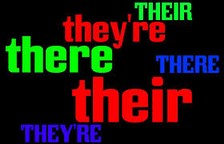Grammatically Challenged? There, Their, They're. It'll Be OK! - The Grammar-Us Blog - Grammar-Us
Main menu:
Grammatically Challenged? There, Their, They're. It'll Be OK!
Our quirky English language is full of pitfalls for those who want to speak it well. For example, we have many words that sound alike but have different spellings and different meanings. Words such as "sea" and "see," "hear" and "here," "whole" and "hole," are called homophones and can be the bane of any good writer’s existence. Possibly the most used – and misused – homophones are "their," "there" and "they’re," which is why I am dedicating this week’s blog post to this triple threat to good grammar.
First, the rule:
There = In that place
They’re = They are
Their = Belonging to them
Over the years, I have created some memory tricks to help me remember which of the three words is the correct one in the context of what I am trying to communicate.
TIPS & TRICKS:
1. There: The word "there" is simply the word "here" with a "t" added. Since "here" indicates a location ("this one, here"), I think of the "t" as indicating "that one, there." That helps me remember to use "there" when I want to indicate where something is.
2. They’re: As I explained in my last post, an apostrophe indicates that something has been left out, and the apostrophe is the bridge to the gap. The word "they’re," therefore, is a contraction of "they are."
3. Their: I have linked the words "our" and "their" in my mind. Both indicate possession. Both end in the letter "r." That helps me remember that "their" means "belonging to them."
BONUS TIP:
Don’t become a victim of auto-
- FRESH WRITING
- TWELVE ERRORS THAT MAKE A GRAMMARIAN GNASH HER TEETH
- THE WHYS AND HOWS OF WRITING AN EFFECTIVE CONSUMER LETTER
- FILLER WORDS: THE "JUNK FOOD" OF COMMUNICATIONS
- Pardon Me, Your Participle is Dangling!
- MAKE BETTER GRAMMAR A NEW YEAR’S RESOLUTION
- The Value Of Personal Letters
- How To Make Your Writing Flow
- How (And Why) To Tighten Up Your Writing
- Why Grammar Matters
- Time For Another Grammar Quiz!
- Editing: The "Make Or Break" Skill
- Proofreading: It Matters More Than You Think!
- Please Don't Ruin A Perfectly Good Tense!
- A Brave New Word
- Homophones: The Sequel
- Coulda, Shoulda, Woulda And Other Incorrectly Written Words
- More Homophones
- Time For Another Grammar Goof Quiz
- A Different Kind Of Colonoscopy (And Semi-Colonoscopy)
- Comparatives & Superlatives: The Good, The Bad, And The Ugly
- Either/Or, Neither/Nor: Decisions, Decisions!
- Let's Agree To Agree
- Avoiding Apostrophe Apocolypse
- Let's Pause To Honor The Comma!
- Three Speech Patterns That Can Compromise Professionalism
- A Hit Parade of Grammar Misses
- Negative Nancy Has Hijacked My Blog!
- Who Dat?
- Avoiding the Ill Effects of Misusing "Affect"
- How To Perfectly Use Six Irregular Verbs
- Random Ramblings
- Me, Myself and I: The Narcissist's Nightmare
- Confounding Compounds
- "All The World's A Stage...": Know Your Audience
- From The Department Of Redundancy Department: The Whole Entire Scoop On "Whole" And "Entire"
- Grammatically Challenged? There, Their, They're. It'll Be OK!
- "Its": It's a Special Exception
- We're Up And Running!